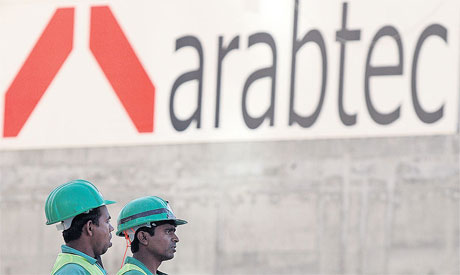
Arabtec Holding, the largest construction firm in the UAE by market capital.(photo: Reuters)
Arabtec Holding ARTC.DU, Dubai's largest listed construction firm, has agreed with the Egyptian army to build one million houses in a project worth LE280 billion ($40.23 billion), it said in a statement on Sunday.
The project, one of the biggest in the region, is seen as a boost to the country of 85 million which has been struggling to attract tourists and foreign investors, amid political turmoil, and saw its foreign reserves drop to a critical low last year.
It will cover 160 million square metres across 13 sites in Egypt for lower income individuals.
The capital will get the lion's share of the units, covering 149 million square metres, while Alexandria, Egypt's second largest city, will have 964,000 square metres, according to state-run Al-Ahram Arabic website.
Other governorates covered by the project include Menoufia and Fayyoum in lower Egypt, as well as Beni Suef, Minya, Assiut, Sohag, Qena, and Luxor in economically disadvantaged Upper Egypt, says Al-Ahram.
The company said it expected that work on the project would start in the third quarter of this year and be completed before 2020, but delivery of units will start in 2017, according to Al-Ahram.
Payment periods for home-buyers will be for up to 20 years, according to Al-Ahram, with a relatively low advance payment of LE10,000 - LE15,000.
The firm did not say how the project will be financed but Hasan Ismail, Arabtec's chief executive, told Reuters on the sidelines of a press conference in Cairo that the land will be given for free.
This will allow Arabtec to offer the units at a 30 to 40 percent discount, according to Al-Ahram.
Ismail added that there will be an agreement with around 40 banks in Egypt to provide financial facilities for limited income individuals.
Egypt's economy has been struggling since a mass uprising toppled autocrat Hosni Mubarak in 2011 when millions of Egyptians took to the streets calling for social justice and better distribution of wealth as well as an end to corruption.
One year later, the same demands emerged bringing an end to Islamist president Mohamed Morsi who was toppled after only one year in office when the army, prompted by mass protests, ousted him on 3 July.
The United Arab Emirates, Saudi Arabia and Kuwait have pledged more than $12 billion to help boost Egypt's economy.
Short link: